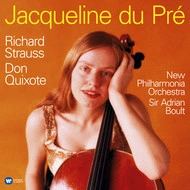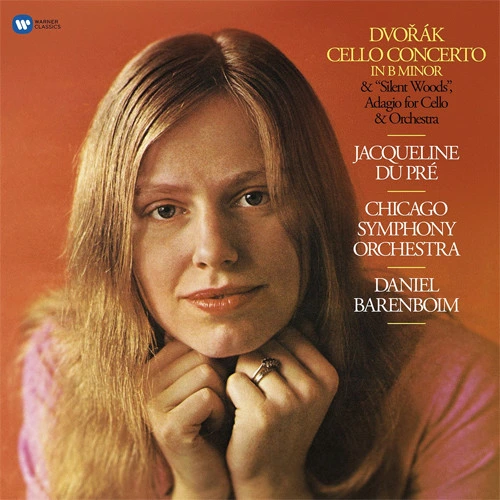180g Vinyl LP!
Jacqueline du Pre performs Don Quixote (Fantastic variations on a Theme of Knightly Character for cello, viola & orchestra, Op. 35) by Richard Strauss along with the New Philharmonia Orchestra lead by Sir Adrian Boult.
The second week of April 1968 was a busy one for Jacqueline du Pre. As well as the planned recording of Strauss's Don Quixote with Otto Klemperer and the New Philharmoina, there were sessions of Schumann and Saint-Saens concertos with her husband Daniel Barenboim, and du Pre and Klemperer were scheduled to perform Don Quixote at the end of the week at the Royal Festival Hall (Klemperer always preferred things this way round, looking upon recording sessions as rehearsals for the "real thing"). Hardly the timetable of a woman suffering the onset of multiple sclerosis; that lay ahead. As the Saint-Saens and Schumann recordings show, here was an artist at the height of her powers. This Don Quixote shows the same. A lack of polish here, a snatched phrase there: both arise out of factors quite other than medical ones.
Klemperer did indeed conduct the first day of sessions on April 6, when he covered much of the work. But - other considerations apart - he was tired and Don Quixote was not among his favorite Strauss; his admiration and affection for the Barenboims had prompted him to agree to the recording, and he withdrew before the second day, leaving Abbey Road protentially 'dark' for the remaining sessions. At first the studio time was used by Laszlo Heltay, who rehearsed the tuttis. It was, however, the last day's-worth of dusty session tapes which, untouched since 1968, suggested possibilities to me. On the box, Sir Adrian Boult, Klemperer's replacement at the Festival Hall a few days later, is listed as conductor of a complete performance.
Judging by sundry noises (pencils dropping, even talking at one point), Boult's single take was probably made with the recording light off and it may have been simply a whim to switch on the recorder. But this is no run-through: du Pre was incapable of such a thing and the intensity throughout is unmistakable and characteristic, whether evoking the haunted night landscape of the Don's vigil (Var. V), the pizzicato sparring with a drenched Sancho Panza (Var. VIII) or the pathos at the work's close.
Even so, the inevitable handful of significant flaws and a missing first bar (caused by a belatedly switched-on recorder) raised a question mark over the performance's acceptability for commercial release. In each of these instances I decided to investigate the material from the preceding Klemperer takes. Edited into the Boult performance, these patches, none longer than about five seconds, go to preserve a remarkable account. Stereo compatibility was aided by the happy fact that both conductors separated their first and second violins to left and right.
Had things turned out differently, the Don Quixote to which du Pre would undoubtedly have returned would have added greater finish to the poetry and fire - solo and orchestral - to be heard here. The sound quality might also have been representative of EMI and Christopher Parker at their considerable best: the two-track tape bears the words 'experimental recording', though only a sketchy microphone diagram survives. As with the many fine off-air accounts of works which great musicians did not record commercially, however, we should value what we have. And here indeed is a valuable document - the cellist unmistakable at any given moment - one made all the more poignant for its ghosts in the machine after the final chord: Boult's "Bravo!" and the orchestra's applause. - Andrew Keener, 1995
Features:
• 180g Vinyl LP
• Recorded April 6, 7 & 9, 1968 at No. 1 Studio, Abbey Road, London
• Edited and digitally remastered at Floating Earth Ltd by Andrew Keener and Mike Hatch from rehearsal tapes
Musicians:
Jacqueline du Pre, cello
Herbert Downes, viola
Desmond Bradley, violin
New Philharmonia Orchestra
Sir Adrian Boult, conductor
Selections:
Richard Strauss (1864-1949)
Don Quixote
Fantastic variations on a Theme of Knightly Character for cello, viola & orchestra, Op.35
Side A:
1. Introduction: Don Quixote Sinks Into Madness
2. Theme: The Knight Of The Mournful Countenance - Sancho Panza
3. Variation I: The Adventure With The Windmills
4. Variation II: The Battle With The Flock Of Sheep
5. Variation III: Discourse Between Knight And Squire
6. Variation IV: The Adventure With The Pilgrims
7. Variation V: The Knight's Vigil
Side B:
1. Variation VI: The Meeting With Dulcinea
2. Variation VII: The Ride Through The Air
3. Variation VIII: The Voyage In The Enchanted Boat
4. Variation IX: The Combat With The Two Magicians
5. Variation X: The Defeat Of Don Quixote
6. Epilogue: Don Quixote's Death
Jacqueline du Pre performs Don Quixote (Fantastic variations on a Theme of Knightly Character for cello, viola & orchestra, Op. 35) by Richard Strauss along with the New Philharmonia Orchestra lead by Sir Adrian Boult.
The second week of April 1968 was a busy one for Jacqueline du Pre. As well as the planned recording of Strauss's Don Quixote with Otto Klemperer and the New Philharmoina, there were sessions of Schumann and Saint-Saens concertos with her husband Daniel Barenboim, and du Pre and Klemperer were scheduled to perform Don Quixote at the end of the week at the Royal Festival Hall (Klemperer always preferred things this way round, looking upon recording sessions as rehearsals for the "real thing"). Hardly the timetable of a woman suffering the onset of multiple sclerosis; that lay ahead. As the Saint-Saens and Schumann recordings show, here was an artist at the height of her powers. This Don Quixote shows the same. A lack of polish here, a snatched phrase there: both arise out of factors quite other than medical ones.
Klemperer did indeed conduct the first day of sessions on April 6, when he covered much of the work. But - other considerations apart - he was tired and Don Quixote was not among his favorite Strauss; his admiration and affection for the Barenboims had prompted him to agree to the recording, and he withdrew before the second day, leaving Abbey Road protentially 'dark' for the remaining sessions. At first the studio time was used by Laszlo Heltay, who rehearsed the tuttis. It was, however, the last day's-worth of dusty session tapes which, untouched since 1968, suggested possibilities to me. On the box, Sir Adrian Boult, Klemperer's replacement at the Festival Hall a few days later, is listed as conductor of a complete performance.
Judging by sundry noises (pencils dropping, even talking at one point), Boult's single take was probably made with the recording light off and it may have been simply a whim to switch on the recorder. But this is no run-through: du Pre was incapable of such a thing and the intensity throughout is unmistakable and characteristic, whether evoking the haunted night landscape of the Don's vigil (Var. V), the pizzicato sparring with a drenched Sancho Panza (Var. VIII) or the pathos at the work's close.
Even so, the inevitable handful of significant flaws and a missing first bar (caused by a belatedly switched-on recorder) raised a question mark over the performance's acceptability for commercial release. In each of these instances I decided to investigate the material from the preceding Klemperer takes. Edited into the Boult performance, these patches, none longer than about five seconds, go to preserve a remarkable account. Stereo compatibility was aided by the happy fact that both conductors separated their first and second violins to left and right.
Had things turned out differently, the Don Quixote to which du Pre would undoubtedly have returned would have added greater finish to the poetry and fire - solo and orchestral - to be heard here. The sound quality might also have been representative of EMI and Christopher Parker at their considerable best: the two-track tape bears the words 'experimental recording', though only a sketchy microphone diagram survives. As with the many fine off-air accounts of works which great musicians did not record commercially, however, we should value what we have. And here indeed is a valuable document - the cellist unmistakable at any given moment - one made all the more poignant for its ghosts in the machine after the final chord: Boult's "Bravo!" and the orchestra's applause. - Andrew Keener, 1995
Features:
• 180g Vinyl LP
• Recorded April 6, 7 & 9, 1968 at No. 1 Studio, Abbey Road, London
• Edited and digitally remastered at Floating Earth Ltd by Andrew Keener and Mike Hatch from rehearsal tapes
Musicians:
Jacqueline du Pre, cello
Herbert Downes, viola
Desmond Bradley, violin
New Philharmonia Orchestra
Sir Adrian Boult, conductor
Selections:
Richard Strauss (1864-1949)
Don Quixote
Fantastic variations on a Theme of Knightly Character for cello, viola & orchestra, Op.35
Side A:
1. Introduction: Don Quixote Sinks Into Madness
2. Theme: The Knight Of The Mournful Countenance - Sancho Panza
3. Variation I: The Adventure With The Windmills
4. Variation II: The Battle With The Flock Of Sheep
5. Variation III: Discourse Between Knight And Squire
6. Variation IV: The Adventure With The Pilgrims
7. Variation V: The Knight's Vigil
Side B:
1. Variation VI: The Meeting With Dulcinea
2. Variation VII: The Ride Through The Air
3. Variation VIII: The Voyage In The Enchanted Boat
4. Variation IX: The Combat With The Two Magicians
5. Variation X: The Defeat Of Don Quixote
6. Epilogue: Don Quixote's Death




 Turntable Accessories
Turntable Accessories Headphone Accessories
Headphone Accessories Cable Accessories
Cable Accessories Vinyl Accessories
Vinyl Accessories Compact Disc Accessories
Compact Disc Accessories







